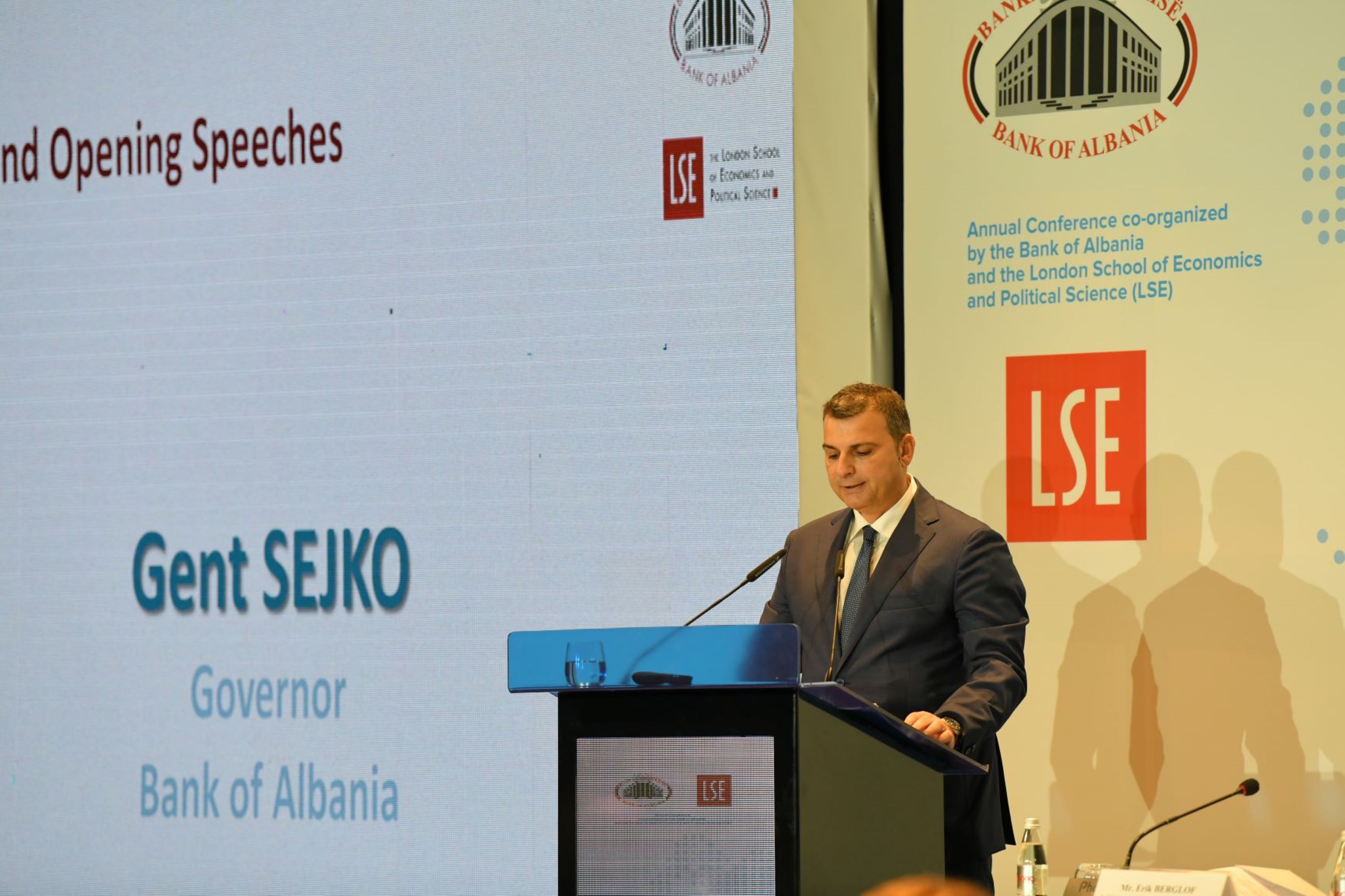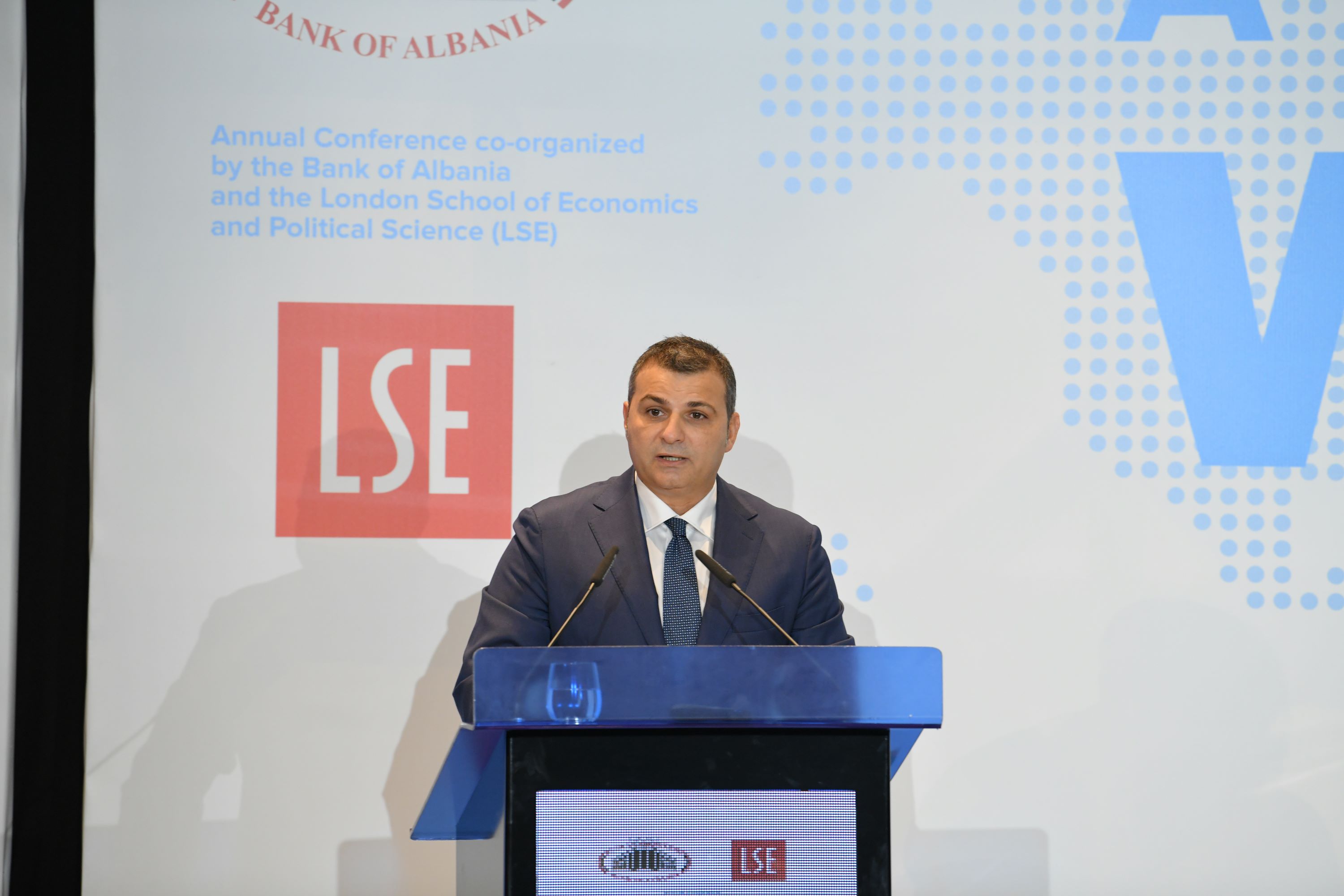BANK OF ALBANIA
PRESS RELEASE
Governor Sejko: Welcome Address to the Annual Conference of the Bank of Albania 2019
Publication date: 10.10.2019
A BRAVE NEW WORLD?
THE FUTURE OF BANKING IN EMERGING EUROPE
Your Excellency Mr President,
Honourable Madam Minister and Chairman of the Parliamentary Committee,
Dear representatives of the banking system, ladies and gentlemen, dear guests,
It gives me great pleasure to welcome you on behalf of the Bank of Albania to our Annual Conference. This year the conference is co-organised again with the London School of Economics and Political Science (LSE), namely its Institute of Global Affairs - internationally renowned for its leading expertise across the social sciences.
The Conference this year will seek to address the latest trends in the banking industry in Albania, in the region and the rest of the world, focusing on challenges and opportunities that lie ahead of us.
Naturally, these issues are of great interest not only to actors in the banking market but also to central banks and other regulators of the financial market. As we share experiences and engage in open discussions, we will be able to identify far-reaching approaches that are best fitted to meet the challenges ahead. We have invited distinguished speakers and experts from renowned international institutions as well as other actors and regulators from Albania and the region.
I am confident the conference will live up to its reputation.

Dear Ladies and Gentlemen,
The financial system and the banking sector at the heart of it play a unique role for economic development and welfare in Albania.
This system provides payment instruments, contributing to the free circulation of products and services. It also offers savings and credit instruments for households and enterprises, promoting therefore development and enhancing welfare. The financial system helps households, enterprises and the economy to withstand shocks, by undertaking risks on its balance sheets and offering products to insure life, business activities and against natural disasters.
Therefore, the efficiency, stability and sophistication of the financial system are essential preconditions for rapid, stable and comprehensive growth. The development level of an economy is inter-related and inter-dependent on the development level of its financial system. This has been extensively illustrated by the Albanian experience over the last three decades.
The progress marked in the first decade of transition was conditioned by, among other things, embryonic developments in the banking and financial sectors. In the second decade, the activity of the banking sector expanded and competitiveness in this sector increased, setting the stage for crediting and economic growth to gather speed. This performance was disrupted by the global financial crisis effects spilled over to Albanian economy. However, unlike in many countries of the region, the crisis did not trigger recession or a proper financial crisis in Albania. Yet, indirect effects were present both in the economy and in the financial system.
As a monetary, supervisory and regulatory authority of the banking sector, in recent years, the Bank of Albania has focused on addressing challenges introduced by the crisis.
Let me present a brief overview.
First, due to aggregate demand slowdown and exchange rate depreciation, the financial situation of households and enterprises worsened; hence non-performing loans rose rapidly and credit supply contracted. Among other things, the rise in non-performing loans pointed to the need for comprehensive improvement of the legal and regulatory environment, especially with regard to the execution of collateral. Against this backdrop, in cooperation with other public agencies, the Bank of Albania compiled and implemented a detailed programme of measures, which addressed thoroughly the identified inadequacies. As a result, the level of non-performing loans dropped rapidly and credit supply improved. This action also created adequate conditions for its growth to gradually pick up the pace.
Second, following the introduction of stricter regulatory requirements on banking activity in the European Union, foreign banks reduced their exposure to both regional economies and Albania. Known also as deleveraging, this effect showed that higher integration of the banking sector exposes us to monetary policies and regulatory requirements applied in home countries. In response, the Bank of Albania has worked towards aligning our domestic supervisory and regulatory framework with European Union standards. We have implemented, in this regard, a new macro-prudential strategy, after the model of the European System of Central Banks. We have also carried out a comprehensive review of the supervisory and regulatory frameworks, to better address the risks to the banking sector: operational risk, market risk, credit risk and liquidity risk. Finally, we have actively participated in an international forum for addressing this phenomenon, known as the Vienna Initiative, and have enhanced our communication with international partners and home-country regulatory agencies.
Third, we have spent a lot of time and energy administering a consolidation process in the banking sector. As a result of this process, which may now be considered as finalised, the number of banks has now been reduced to 12. This has created the premises for the banking sector to be more motivated to lend, innovative in terms of products, and more competitive in terms of cost.
From a broader perspective, the Bank of Albania has worked on improving the regulatory architecture of the financial system in Albania and strengthening financial safety nets. Together with other public agencies, we have, established the Financial Stability Advisory Group; improved the legal framework for the functioning of the Deposit Insurance Agency; approved the Resolution Law; drafted a sub-legal and regulatory framework; and, established the necessary structures for them to function.
In parallel, we have adopted a modern framework for formulating and implementing the monetary policy, and steadily maintained an accommodative stance. Monetary stimulus has enabled the financial environment in Albania to be transparent, and have low interest rates, ample liquidity and moderate exchange rate fluctuations. This has boosted consumption and private investments, reduced credit price, and eased debt servicing costs for all segments of the economy.
Reflecting these actions, the Albanian economy has made notable progress towards steady and long-term growth. The progress has been characterised by gradual acceleration of the pace of growth, expansion of employment and decline in unemployment, as well as improvement of private sector balance sheets. In particular, the banking sector appears liquid, well capitalised, with good profitability indicators. Regulatory capital hovers around 18%, notably above the minimum requirement, whereas the ratio of non-performing loans has dropped to 11% against the 25% maximum level recorded in 2014.

Dear ladies and gentlemen,
The ultimate objective of our work has been and remains promoting sustainable development for the country. The philosophy of our work is built on four main pillars: professionalism, responsibility, accountability, and transparency.
This philosophy has been tested and enriched with some valuable lessons learned during the last decade:
- First, monetary, supervisory and regulatory authorities should adopt a proactive approach to the country's monetary and financial stability. This requires adequate institutional capacities and adopting a counter-cyclical approach, both toward monetary policy and macro-prudential policy. It also requires constantly identifying current and potential challenges in order to address them in due time.
- Second, long-term economic growth should be anchored in continuous structural reforms. Public authorities may find it virtually impossible to predict or avoid shocks completely; however, both public authorities and the private sector may minimise the effects of these shocks through structural reforms aimed at creating productive and flexible structures, and preserving balance sheet stability. Public authorities and the private sector should be aware of the fact that long-term benefits from reforms exceed their short-term costs.
- Third, financial integration provides an additional channel of exposures to foreign shocks, whether in the form of global financial crisis or volatility in the regulatory framework. Overall, financial integration has been and remains a positive factor for development. In the case of Albania, it brings in financial capital and managerial know-how, with a series of positive effects on the Albanian economy, spearheading the economic and political integration of the country. Yet, integration requires fostering cooperation and exchanging information with our international partners and counterpart institutions.
- Lastly, the monetary and financial stability of the country should not be seen as an exclusive responsibility of the central bank, notwithstanding its primary role in it. It requires the contribution and cooperation of all state authorities.
Dear ladies and gentlemen,
The Albanian economy has solid premises for continuing and even accelerating the pace of growth. Strengthened financial stability, coupled with prudent monetary policies, offers additional guarantees for its sustainability.
However, let me point out that many challenges lie ahead of us.
From a broader perspective, the financial industry, both in our region and globally, is under pressure from four powerful currents:
- Rapid development of information technology, which has created opportunities for financial innovation and has challenged classical banking models. New payment and credit instruments, new financial market actors, and new business models, such as digital and electronic banking and payments, boost the penetration of financial services. Conversely, they challenge not only classical actors of the financial sector but also its regulators.
- Globalisation, which has expanded the scope of market actors and regulators. This phenomenon significantly exposes emerging economies to volatility in the regulatory framework or in the risk appetite in advanced economies.
- Re-regulation, currently underway in the financial system in Europe and globally. This process is aimed at enhancing security in the banking sector, lowering the probability of systemic crisis, and enhancing the capacities of authorities for managing them. However, it imposes additional costs on the banking sector and places it under less favourable conditions vis-à-vis other market participants.
- Very low interest rates that characterise many segments of the global financial market. These rates reflect the accommodative monetary policy stance adopted by major central banks, the decline in global productivity and unfavourable demographic developments in advanced economies. These have a toll on the balance sheets of broader segments of the financial market such as banking sector, pension funds and insurance companies.
From a nearer-term perspective, Albania needs to improve financial literacy, across the board. Among other things, financial education would help both individuals and firms establish sounder financial situations and reduce financial risks such as unnecessary exposure to exchange rate volatility. The Bank of Albania has been on the vanguard of financial education in Albania and will continue to spearhead such efforts.
Albania needs also to develop further payment systems and improve access to finance for various segments of the society, such as small and medium-sized enterprises or the rural sector. The Bank of Albania has responsibly exercised its duties in the area of payment system development. In this regard, we:
- Established, in 2015, the National Payments System Committee, to coordinate the work of all relevant public and private sector agencies;
- Compiled the draft law “On payments services”, which approximates the respective EU directive and paves the way for developing new payment products; and,
- Improved the technological infrastructure for payments, reducing therefore their costs.
However, our work may not be considered as completely finished.
Lastly, Albania should pay attention to the development of new financial market segments, such as capital markets and pension and investment funds. In this context, alignment of the legal and regulatory framework is of primary importance with a view to preventing the potential emergence of systemic risks or the possibility of regulatory arbitrage.
***
Dear ladies and gentlemen,
Our agenda for the work that lies ahead of us is as complex as ambitious. Its successful realisation will enable our economy to grow at a fast and steady pace, and will mark a step forward in our journey towards EU integration.
On behalf of the Bank of Albania, let me affirm our readiness to rise to the challenge. I am also confident that today's conference will provide a significant contribution to finding optimal solutions.
Hoping that you will find the Conference and your stay in Tirana both valuable and enjoyable, I wish the conference a great success! Thank you for your attention!

 Twitter
Twitter
 Youtube
Youtube
 Facebook
Facebook
 Flickr
Flickr
 RSS
RSS
 Subscribe
Subscribe
 Feedback
Feedback